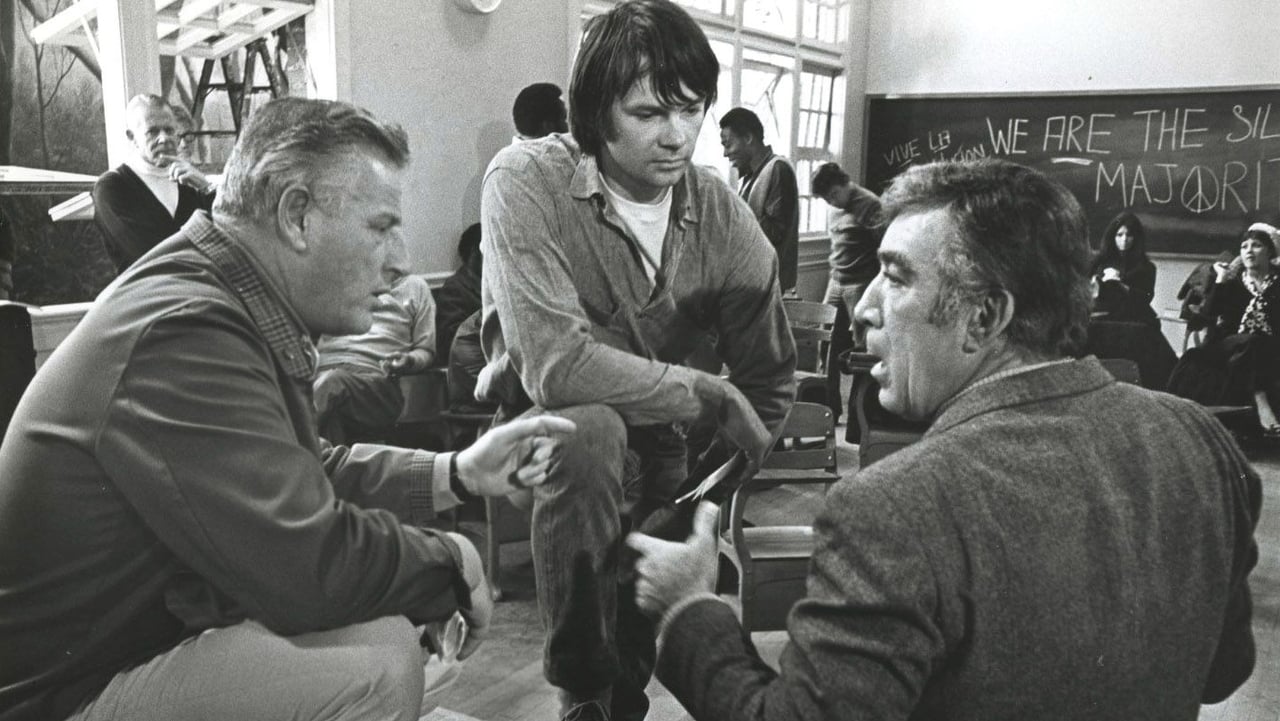


To me, this movie is perfection.
... View MoreIt was OK. I don't see why everyone loves it so much. It wasn't very smart or deep or well-directed.
... View MoreWhile it doesn't offer any answers, it both thrills and makes you think.
... View MoreIt's the kind of movie you'll want to see a second time with someone who hasn't seen it yet, to remember what it was like to watch it for the first time.
... View MoreFilmed on "The University of the Pacific" campus in Stockton, R.P.M. (political REVOLUTIONS per minute) at the time of its 1970 release was regarded as the worst of the "counterculture-revolution-on-campus" sub-genre of films. It has not improved with age and almost 45 years later is notable only for two good "Melanie" songs "Stop! I Don't Wanna' Hear It Anymore" and "We Don't Know Where We're Going" which play over three nice montage sequences of the President of fictional Hudson College coming and going to the campus Administration Building.Its fundamental problem (other than having hacks like Stanley Kramer as acting for-the-camera director and Erich Segal as writer) is that the focus is on adults rather than on students. Although casting an aging Gary Lockwood as the student leader meant than no viewer at the time imagined the film would ever have an authentic texture. Even the extras playing the sundry students look to be in their thirties; perhaps their list of demands included unrestricted access to the swimming pool in "Cocoon".The adults are Ann-Margret (Rhoda) and Anthony Quinn (Prof. F.W.J. 'Paco' Perez), whose performances simply do not complement each other in the few scenes they have together (blame Kramer's directing). Ann's big emotional scene midway through the film is an absolute mockfest moment. Poor Ann was one of those women who did not age gently but rather by plateau; she hit her first one in the late 1960's - almost overnight losing all her youthful glow. The idea was to make a 53 year-old professor seem hip because he lived with his 25-year-old graduate student, but the age disparity seems less between them than between Rhonda and a typical graduate student.Then again, what do I know? I'm only a child.
... View MoreIn "R.P.M." students take over and occupy the administration building of a California college as school President Tyler resigns. After midnight, the College Board of Trustees decides to replace Tyler with Professor "Paco" Perez (Anthony Quinn), a 53 year-old sociology teacher. He has three main assets: (1) He is popular with the student body, (2) he has a Spanish surname, and his hiring would exemplify progressivism, and (3) he lives with a 25 year-old graduate student Rhoda (Ann-Margret) who has difficulty in staying clothed. An obvious liberal, Perez attempts to negotiate with the students. A problematic situation arises as he became part of the "establishment" when he was appointed by conservative deans. He agrees with 75 percent of the student demands, but those concessions are not enough. One of the three demands not accepted is that the students want to hire the professors! But the students, led by 33 year-old grad student Gary Lockwood (Rossiter) and 31 year-old Paul Winfield (Dempsey), are reticent. When they do not obtain acceptance on ALL of their demands, they foolishly decide to destroy school property (computer equipment). As Perez is backed up against a wall, his option is to call in the police. So where is the resolution? Erich Segal's script is trite and hardly rises above comic-book level. Concerning the film's direction, where is the genuine emotion and character development? Anthony Quinn is always good, but in this movie he is miscast. Worse, 30 year-old Ann-Margret's performance as a collegian is ludicrous; she is way too old to be a typical grad student. As she does not exactly radiate intelligentsia, one wonders how she ever became an undergraduate. The impression does arise that she may have earned her bachelor's degree by lying on her back. Chemistry is lacking between her and lover Quinn, whom she even calls a hypocrite. Both Lockwood and Winfield are also too old for their respective characters.The late 1960s and early 1970s was a time of college campus radicalization, although the students on the far left comprised only a small percentage of the school population. But they were both vocal and active. They were quite volatile, hence R.P.M. = Revolutions per Minute. All in all, this pointless movie certainly shows its age.
... View MoreOkay some people really didn't like this movie but I did. Yeah the revolting students are stereotypically revolting in their acting and words. Of course I may be just a little biased as I was over in Nam in 1970 (71 and 73 too). So when the cops start busting up the hippies it didn't bother me too much. Now everything leading up to that part was okay as far as acting went. The script seemed a little trite with the speeches by the protesters, pretty standard gibberish of the times. Anthony Quinn did his usual fine job. He is a liberal professor who gets stuck with the deanship of the school when the former one retires from stress caused by the sit in. He tries to talk with the sitters but they not only will not yield on the last three of twelve demands even after getting 1 thru 9 agreed too but are extremely insulting and rude to him. Not really the way to get what you want if you make the powers that be mad. Quinn finally has enough and sends in the cops. Heads get busted and 7 students and 4 cops get sent to the hospital. Ann-Margret is the half his age grad student who he is living with at the time. She is a liberal and cannot understand when Quinn sends in the cops. At the end you see her and other students break the police line to help the sitters who are getting the snot beat out of them. Teda Bracci plays one of the sitters. She is a horse face with the worst attitude of the whole bunch, then when she breaks out with the others kicks two cops in, shall we say, the lower regions. I was so hoping to see her clubbed to the ground and be one of the seven. Oh well, it is only a movie after all.
... View MoreCampus radicals threaten to take over their university; newly-appointed campus president Anthony Quinn attempts to act as a mediator between the angry kids and the stuffy deans. Dated, talky rabble-rouser from esteemed director Stanley Kramer, working from a weak script by "Love Story" author Erich Segal. Segal doesn't lend much insight into the students or their demands, but Kramer gets a pretty good performance from Quinn, trying hard in a hopeless role. Ann-Margret has a small but colorful part playing Quinn's girlfriend. Otherwise, what might have been a fairly timely melodrama is instead tired, drab, and ultimately pointless. *1/2 from ****
... View More